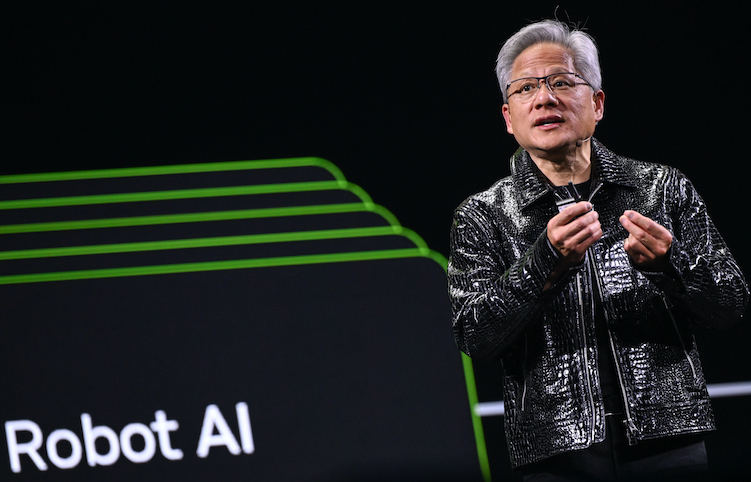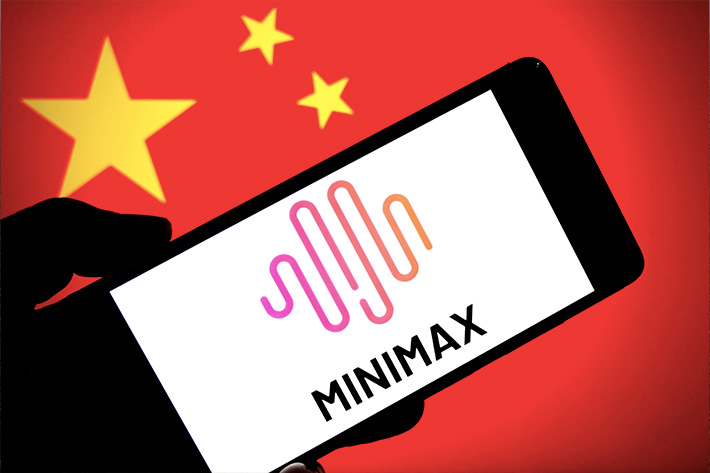Nvidia CEO Jensen Huang flew in to Taipei on Friday to visit TSMC, his chip foundry partner, as speculation builds that the chip designer is working on a new AI chip for the China market.
Nvidia, now the world’s most valuable company, is having to walk a delicate line because of huge geopolitical friction between the US and Beijing over access to its advanced chips.
Huang’s visit, just days ahead of Nvidia’s earnings release on Wednesday, comes as the company has asked some of its suppliers to stop work related to the H20 chip following Beijing’s caution over the chip’s security risks, and as it develops a new AI chip tailored for the China market.
ALSO SEE: AI and Tech Optimism Sends Shanghai Stocks to a Decade High
“My main purpose coming here is to visit TSMC,” he told reporters, adding that he would only stay a few hours and leave after dinner with TSMC leaders, according to a live feed broadcast by local media at Taipei’s Songshan airport, where he landed in a private jet.
He said TSMC had asked him to deliver a speech. And the chipmaker confirmed this in a statement, saying Huang would give an internal speech on his “management philosophy”. It did not elaborate.
Six new chips
Huang said he came to thank TSMC, where they have taped out six brand-new chips, including a new GPU and a silicon photonics processor for Nvidia’s next-generation Rubin-architecture supercomputers. ‘Tape out’ refers to finalizing the design of a chip so production can begin.
“This is the first architecture in our history where every single chip is new and revolutionary,” he said. “We’ve taped out all of the chips.”
US President Donald Trump earlier this month opened the door to the possibility of more advanced Nvidia chips beyond the H20 being sold in China, and reached a deal with Nvidia and AMD under which the US government would receive 15% of the revenue from sales of some advanced chips in China.
Reuters this week reported that Nvidia was working on a new chip tentatively named the B30A, based on its latest Blackwell architecture, that will be more powerful than the H20 model.
Asked about the B30A, Huang said Nvidia was in talks with the US over offering China a successor to its H20 chip, but that it was not the company’s decision to make.
“It’s up to, of course, the US government, and we are in dialogue with them, but it is too soon to know,” he said.
Nvidia only received permission in July to recommence sales of the H20. It was developed specifically for China after export restrictions were put in place in 2023, but the company was abruptly ordered to stop sales in April.
China warning on Nvidia chips
Shortly after Washington’s green light, Nvidia placed orders for 300,000 H20 chips with TSMC to add to its existing inventory due to strong demand from Chinese companies, Reuters reported.
But days later, Nvidia was hit by allegations from China’s cyberspace regulator and state media that the US company’s chips could pose security risks.
Chinese authorities later warned Chinese tech firms about purchasing the H20, raising concerns about potential information security risks. Nvidia, meanwhile, says its chips have no backdoor risks.
Foxconn has been asked by Nvidia to stop work related to the H20 chip, according to two people briefed on the matter who spoke to Reuters. A third source said that Nvidia wanted to work through its existing H20 inventory first.
Foxconn did not immediately respond to a request for comment.
Trade publication The Information reported on Thursday that Nvidia instructed Arizona-based Amkor Technology to stop production of its H20 chips this week and also notified South Korea’s Samsung Electronics, citing two people with direct knowledge of the communications.
Amkor handles advanced packaging for the chip, while Samsung Electronics supplies high-bandwidth memory chips for the model.
Neither company immediately responded to a Reuters request for comment.
The ‘H20 is not a military product’
Asked whether Nvidia had asked suppliers to halt production, Huang told reporters in Taipei that they had a significant number of H20 chips prepared and were now waiting for purchase orders from China customers.
“When we receive the orders, we will be able to purchase more,” he said.
“We constantly manage our supply chain to address market conditions,” Nvidia spokesperson said in a statement, adding, “As both governments recognise, the H20 is not a military product or for government infrastructure.”
Huang said that shipping the H20 to China was not a national security concern and that the ability to ship the H20 chips to China was “very much appreciated”.
- Reuters with additional editing by Jim Pollard
ALSO SEE:
Cadence and Nvidia Dealings in China Drawing Close Scrutiny
SoftBank, Intel ‘Had Talks on Chip Unit Before $2bn Stock Deal’
Altman Agrees the AI Market is a ‘Bubble’ That Could Soon Burst
Trump Lauds Intel CEO After Meeting Him, Call for Him to Resign
US ‘Put Trackers in AI Chip Shipments to Catch Diversions to China’
China Pressing Tech Giants To Stop Buying Nvidia’s H20 AI Chips
Nvidia, AMD ‘Agreed to Pay 15% of China Chip Revenue to US’
























